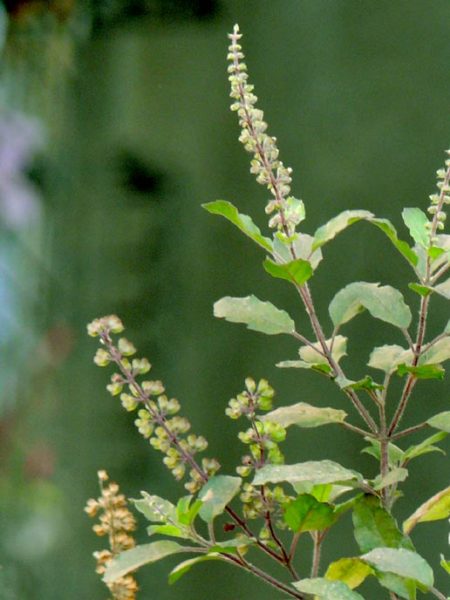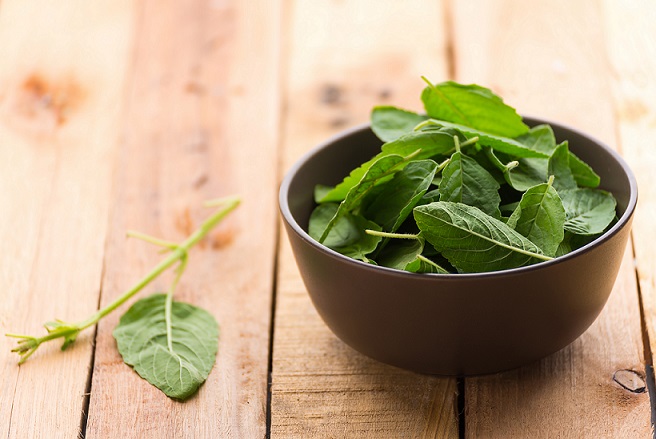14 health benefits of holy basil
Botanical Name: Ocimum sanctum
Origin, Distribution and Composition
Holy basil is a many branched, erect, stout and aromatic herb. It grows up-to the height of about 75 cm and is hairy all over.
The plant has tender, egg-shaped leaves, usually smooth, up-to 2.5 cm in length, small, purplish or reddish flowers in small compact clusters on slender spikes, small fruits and yellowish or reddish seeds. The herb is bitter and pungent.
The leaves of holy basil yield an essential oil which contains eugenol, carvacrol, methyl eugenol and caryophyllene. It has the property of destroying bacteria and insects.
Holy basil can be taken in form of capsules, tea, tinctures or raw leaves.

Healing power and curative properties of holy basil
The plant has medicinal properties. The leaves are nerve tonic and sharpen memory. They promote the removal of catarrh matter and phlegm from the bronchial tubes. The leaves strengthen the stomach and induce copious perspiration.
The seeds of the plant are mucilaginous or starchy and nourishing. They have a soothing effect on the skin and the mucous membranes. They also increase the volume of urine.
1. Fevers
The leaves of the plant are specific for many fevers. During the rainy season, when malaria and dengue fever are widely prevalent, tender leaves, boiled with tea, act as a preventive against these diseases.
In case of acute fevers, a decoction of the leaves boiled with powdered cardamom in half a litre of water and mixed with sugar and milk, brings down the temperature.
2. Sore Throat
Water boiled with holy basil leaves can be taken as a drink in case of sore throat. This water can also be used as a gargle.
3. Respiratory Disorders

The herb is useful in the treatment of respiratory system disorders. A decoction of the leaves, with honey and ginger is an effective remedy for bronchitis, asthma, influenza, cough and cold.
A tea made of the leaves, cloves and common salt also gives immediate relief in case of influenza. They should be boiled in half a litre of water till only half the water is left and then taken.
4. Kidney Stones
Basil has strengthening effect on the kidney, in case of renal stones, the juice of basil leaves and honey, if taken regularly for six months, will expel them via the urinary tract.
5. Heart Disorders
Holy Basil has a beneficial effect in cardiac disease and the weakness resulting from them. It reduces the level of blood cholesterol.
6. Children's Ailments
Common paediatric problems like cough, cold, fever, diarrhoea and vomiting respond favourably to the juice of basil leaves. If pustules of chicken pox delay their appearance, basil leaves taken with saffron will hasten them.
7. Stress
Basil leaves are regarded as an adaptogen or anti-stress agent Recent studies have shown that the leaves afford significant protection against stress.
Even healthy persons can chew 12 leaves of basil, twice a day, to prevent stress. It purifies blood and helps prevent several common ailments.
8. Mouth Infections
The leaves are quite effective for the ulcers and infections in the mouth. A few leaves chewed will cure these conditions.
9. Insect Bites
The herb is a prophylactic or preventive and curative for insect stings or bites. A teaspoon of the juice of the leaves is taken and repeated after a few hours.
Fresh juice must also be applied to the affected parts. A paste of the fresh roots is also effective in cases of bites of insects and leeches.
10. Skin Disorders
Applied locally, basil juice is beneficial in the treatment of ringworm and other skin diseases. It has also been tried successfully by some naturopaths in the treatment of leucoderma.
11. Eye Disorders
Basil juice is an effective remedy for sore eyes and night-blindness, which is generally caused by deficiency of vitamin A.
12. Teeth Disorders
The herb is useful in teeth disorders. Its leaves, dried in the sun and powdered, can be used for brushing teeth. It can also be mixed with mustard oil to make a paste and used as tooth paste.
This is very good for maintaining dental health, counteracting bad breath and for massaging the gums. It is also useful in pyorrhoea and other teeth disorders.
13. Headaches
Basil makes a good medicine for headache. The leaves mixed with sandalwood paste can also be applied on the forehead for getting relief from heat, headache and for providing coolness in general.
14. Other Diseases
The tea of the leaves can be given with beneficial results in gout and gonorrhoea. This is also useful in neuralgia. The juice of the leaves is a well-known remedy for earache and dullness of hearing.
The seeds of the plant are useful in diarrhoea, chronic dysentery, habitual constipation, gonorrhoea, internal piles, cough, kidney disorders and fever. The mucilaginous jelly, formed by infusing 4 to 12 grams of the seeds in cold water for sometime can be taken with sugar to treat these diseases.
The cold infusion can also be taken for relieving pain after childbirth. A poultice of the seeds are beneficial for sores and sinuses.



